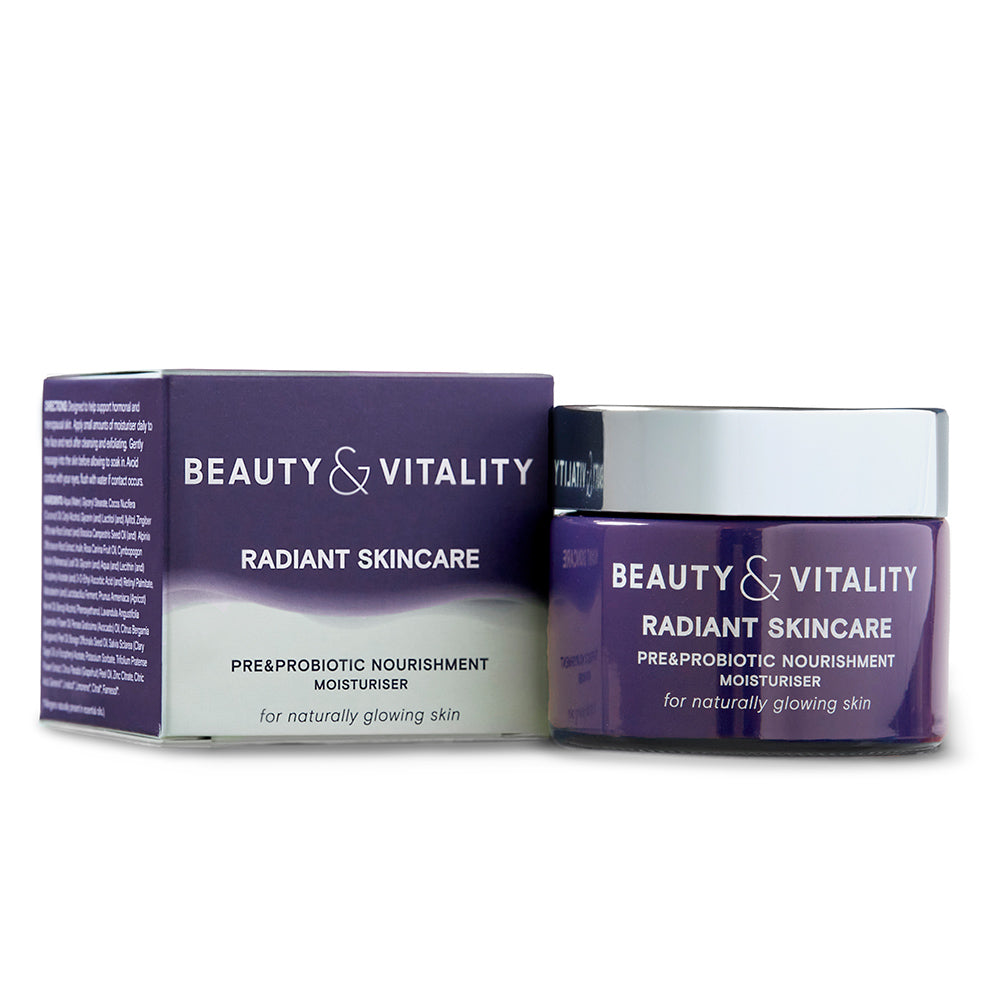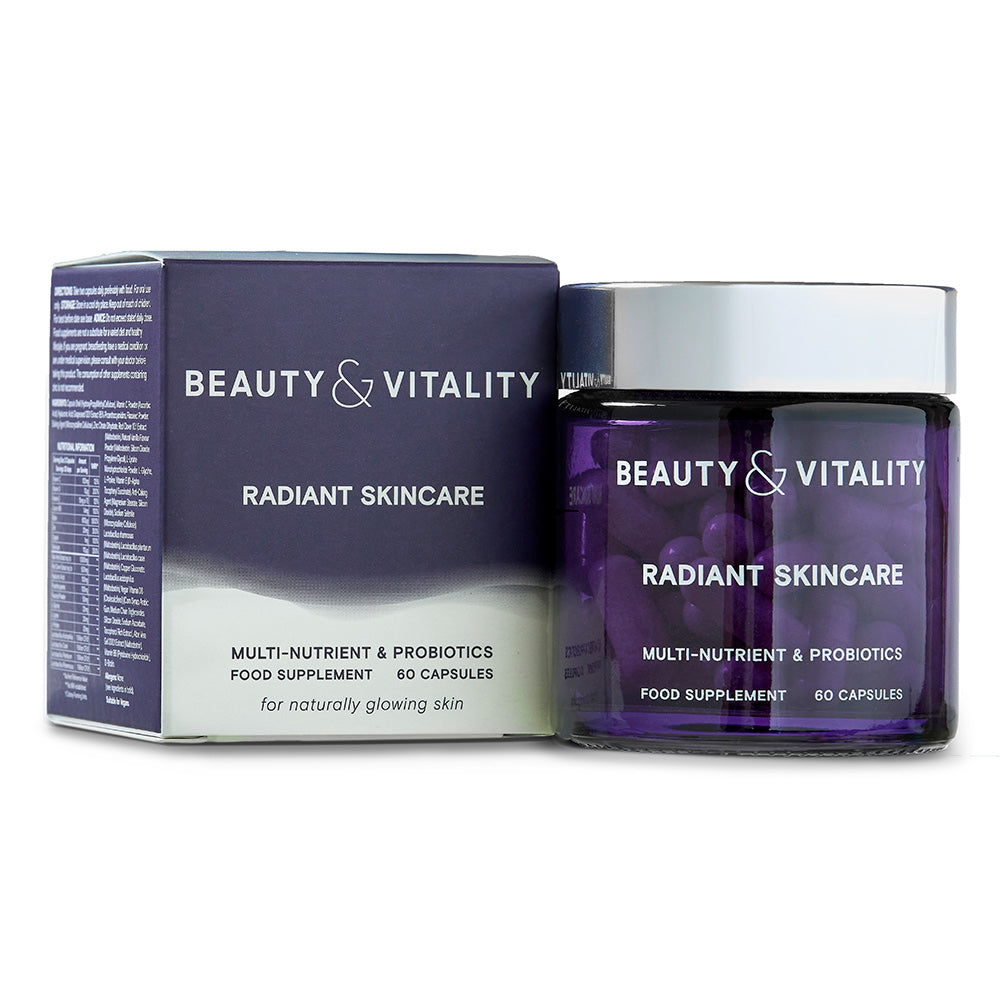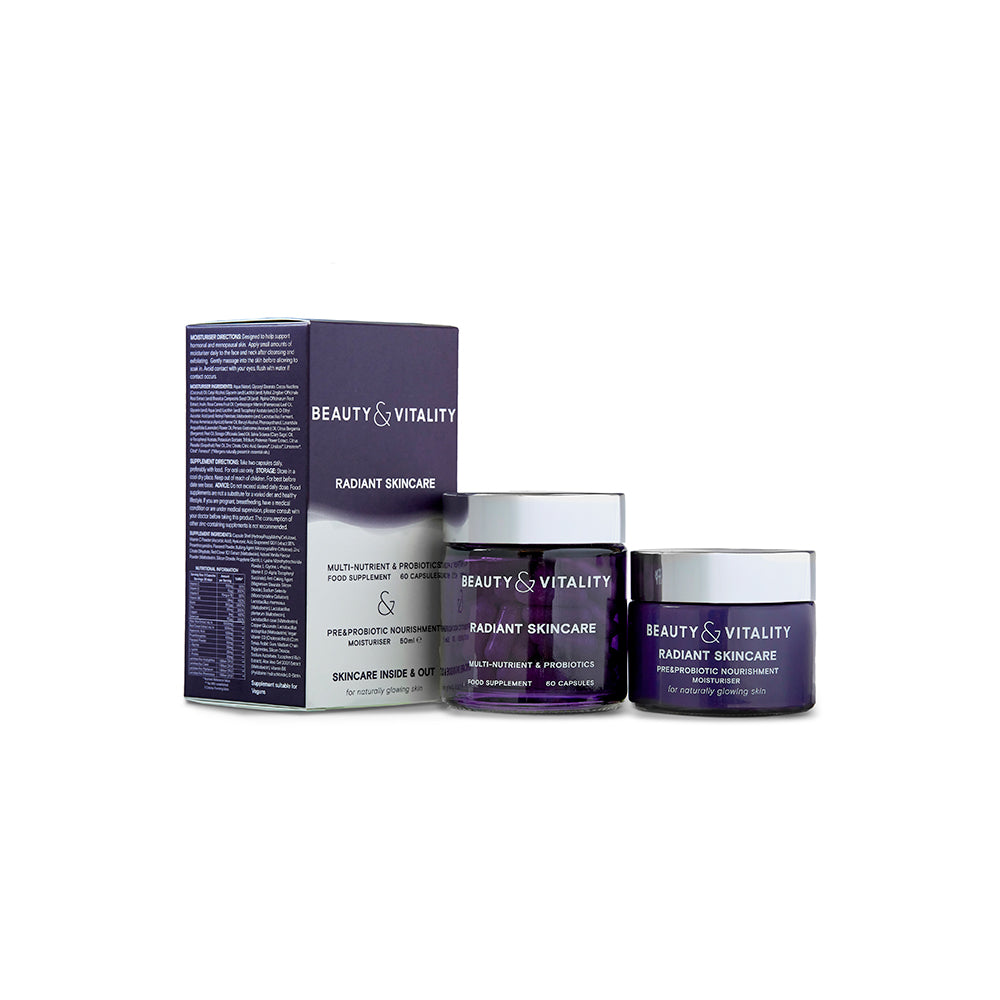
Perimenopause can change your skin, leaving it dry, feeling loose and thinner potentially leading to early onset of wrinkles, jowls and slack skin. You may also experience hair thinning, rashes, acne and other skin irritations.
The following article suggests ways to manage including diet and lifestyle changes, moisturiser and supplement regimes such as Beauty & Vitality’s Radiant Skincare range.
How to Care for Your Skin During the Perimenopause
Perimenopause can bring with it noticeable changes to skin and hair. As oestrogen levels reduce, your skin can become drier, feel looser and thinner. You may also notice more hair on your face and less on your scalp but you can lessen these effects with the right care.
Dry Skin and Lips
During the menopause your skin’s ability to maintain moisture levels is reduced which can be particularly noticeable in dry conditions such as the winter months with the heating on.
If you’re experiencing dry skin try:
- Washing with a mild cleanser rather than soap.
- Apply a good moisturiser after bathing or whenever your skin feels dry.
- See a dermatologist if skin dryness persists
Menopausal skin will feel dryer as your natural oil production weakens. To help keep skin hydrated you should avoid long showers, moisturise at least twice a day and whilst your skin is damp to boost hydration
B vitamins and Zinc play an important part in supporting skin health. Vitamin B promotes growth of new skin cells and so can help heal damaged skin, while zinc helps build the formation of collagen - a structural protein for skin. Taking supplements containing B vitamins and Zinc minerals can help keep lips hydrated.
Jowls, Slack Skin and Wrinkles
Studies suggest women lose on average 30% of collagen levels in the first 5 years of the menopause, after which it slows to about 2% a year. As collagen levels drop, so the skin can be more prone to reduced firmness and sagging, especially around the jawline, neckline and cheeks which, in turn can lead to jowls, thinning skin, crepey neck and wrinkles.
If concerned you could try:
- Protecting your skin from the sun by applying good quality SPF products before going out.
- Consider using skincare products that contain pre & probiotics as well as other skin nutrients such as retinols and peptides: pre & probiotics to help boost your skin’s microbiome to strengthen skin defences, help slow the signs of ageing, reduce fine lines and wrinkles; retinols (such as Vitamin A) to help cell regeneration, prevent acne, smooth fine lines and wrinkles and more; peptides (such as the Copper ingredient) to help stimulate collagen production.
To help counter the effects of the peri menopause on your skin

Radiant Skincare Prebiotic & Probiotic Moisturiser (50ml)

New Clean Formula Radiant Skincare Multi-Nutrient (60 tablets)

New Clean Formula Radiant Multi-Nutrient & Moisturiser Kit
Hair Loss
You may notice increases in hair loss through the menopause, including thinning and/or receding hair lines which again can be the direct result of hormone levels dropping.
To help counter these effects, consider diet and lifestyle/stress levels. For diet try increasing phytoestrogen-rich foods in your diet. Phytoestrogens are natural plant substances that behave like weak oestrogen in the body and may help to balance hormones.
Foods that contain the best healthy sources of phytoestrogens include:
- beans and pulses
- fermented soya products (tempeh, miso and natto)
- flax seeds and sesame seeds
- fruits and vegetables in general also contain phytoestrogens
Increases Facial Hair
If you suffer from increases in facial hair we recommend seeing a dermatologist to help provide personalised advice on the right solution for your skin that may be too sensitive for waxing or laser treatments.
Perimenopause Rashes and Other Skin Irritations
As we grow beyond 50 the pH levels in our skin change leaving the skin more prone to rashes and irritations. Conditions such as eczema and rosacea may worsen. If this is the case consider skincare products with no/low fragrance levels and supplements that can help restore the skin’s microbiome. Failing that, we recommend you seek the advice of a qualified dermatologist.
Pimples & Acne
Outbreaks of pimples and acne are not uncommon as you progress through the menopause, again a reflection of the changes in hormone levels. At Beauty & Vitality we believe the best option in these circumstances is to take a probiotic-enriched supplement and moisturiser to help strengthen your skins’ defences to counter breakouts and acne. You might also consider:
- Avoiding products and situations that will dry out your skin (use a good SPF product when going outside for example).
- Wash your skin with a cleanser product. based on salicylic acid to help unclog pores.
Other conditions may include age spots, more bruises and general increases in appearance of fine lines and wrinkles.
A good diet, sun protection and supplements designed to help improve ageing skin conditions are recommended and moisturiser more regularly.
Eat brightly coloured fruits and vegetables (broccoli, spinach, carrots, blueberries, strawberries, apples etc) in as many colours as possible because these are packed full of antioxidants, or again look for moisturisers and supplements that can deliver this such as Beauty & Vitality.
Finally, make sure you’re getting plenty of exercise and balance into your life. Manage stress levels and get plenty of sleep! But, if in doubt seek the advice of a professional.
If you have further questions about perimenopausal skin, contact our friendly team at Beauty and Vitality.
Safety
The information provided on this site is for educational purposes only and is not intended to diagnose or treat any medical condition. If you are taking any medications, have a diagnosed medical condition, or are pregnant or breastfeeding, please consult your doctor or health practitioner before taking supplements.
